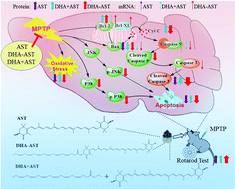Docosahexaenoic acid-acylated astaxanthin ester exhibits superior performance over non-esterified astaxanthin in preventing behavioral deficits coupled with apoptosis in MPTP-induced mice with Parkinson's disease†
Abstract
Non-esterified astaxanthin (AST) has been reported to exhibit protective effects from Parkinson's disease (PD). Notably, DHA-acylated astaxanthin ester (DHA-AST) is widely distributed in the seafood. However, whether DHA-AST has an effect on PD, and the differences between DHA-AST, non-esterified AST and the combination of non-esterified AST (AST) with DHA (DHA + AST) is unclear. In the present study, mice with PD, induced by 1-methyl-4-phenyl-1,2,3,6-tetrahydropyridine (MPTP), were employed to investigate the effects of DHA-AST, AST and DHA + AST on Parkinson's disease. The rotarod test results showed that DHA-AST significantly suppressed the PD development in MPTP-induced mice, and was better than the effects of AST and DHA + AST. Further mechanistic studies indicated that all three astaxanthin supplements could inhibit oxidative stress in the brain. It was noted that DHA-AST had the best ability to suppress the apoptosis of dopaminergic neurons via the mitochondria-mediated pathway and JNK and P38 MAPK pathway in the brain among the three treated groups. DHA-AST was superior to AST in preventing behavioral deficits coupled with apoptosis rather than oxidative stress, and might provide a valuable reference for the prevention and treatment of neurodegenerative diseases.



 Please wait while we load your content...
Please wait while we load your content...